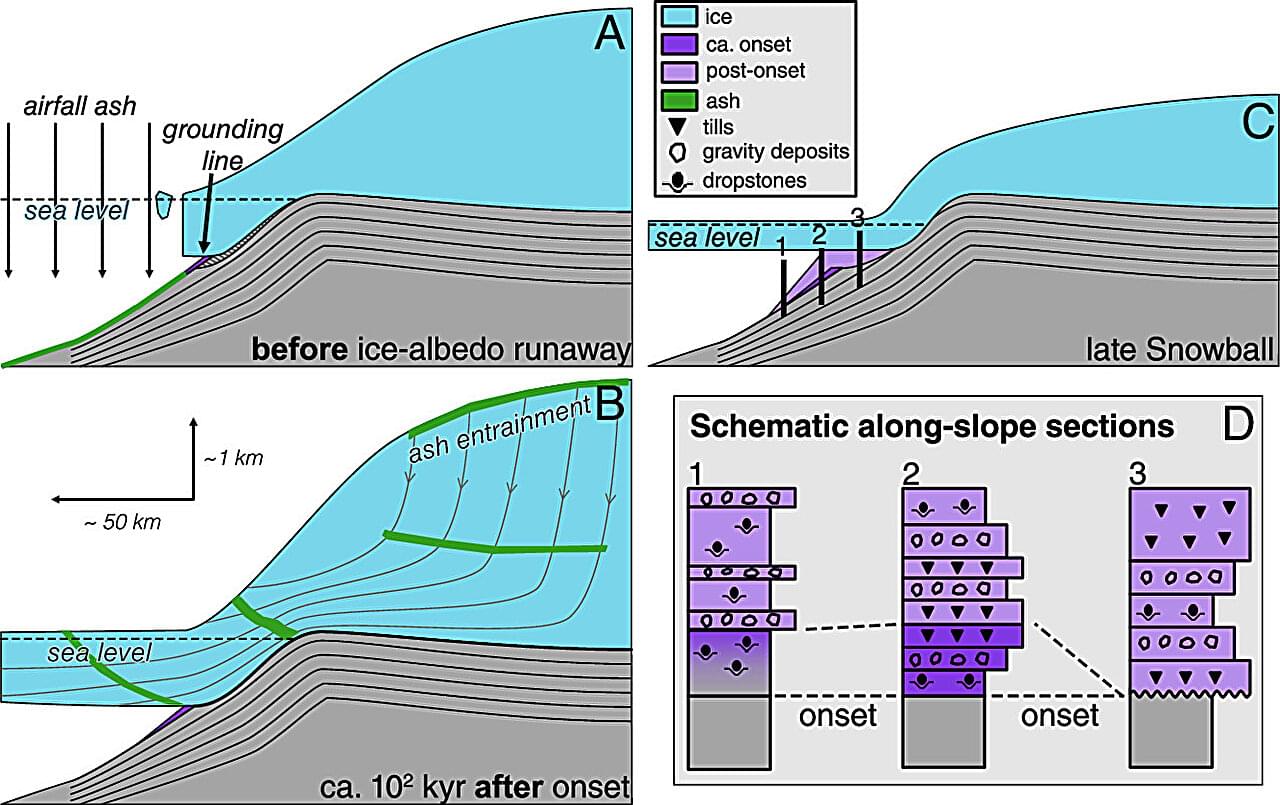Durham University has contributed to new international research that critically assesses the intricate relationship between urban digitization and sustainability, focusing on the significant environmental impact of data centers.



Scientists at the University of California, Berkeley, and Boise State University have found evidence suggesting that the Marinoan glaciation began approximately 639 million years ago and lasted for approximately 4 million years. In their study published in the Proceedings of the National Academy of Sciences, the group used drone and field imagery along with isotopic dating of glacial deposits to learn more about global glaciation events during the Neoproterozoic Era.
Prior research has shown that during the early days of the planet, during the Neoproterozoic Era, Earth underwent two ice ages. The first, known as the Sturtian glaciation, lasted approximately 56 million years and covered the entire planet with ice. Less is known about the second event, called the Marinoan glaciation. In this new effort, the research team set themselves the task of figuring out when it began and how long it lasted.
The work involved sending drones over a part of Namibia, where prior research has uncovered evidence of glacial activity during the Marinoan. This allowed the team to map sedimentary layers that were stacked up in a way that showed little vertical shift had occurred, which meant the glaciers did not move much during the time they were there. Additional field imagery helped confirm what the team found in the drone images.

Criegee intermediates (CIs)—highly reactive species formed when ozone reacts with alkenes in the atmosphere—play a crucial role in generating hydroxyl radicals (the atmosphere’s “cleansing agents”) and aerosols that impact climate and air quality. The syn-CH3CHOO is particularly important among these intermediates, accounting for 25%–79% of all CIs depending on the season.
Until now, scientists have believed that syn-CH3CHOO primarily disappeared through self-decomposition. However, in a study published in Nature Chemistry, a team led by Profs. Yang Xueming, Zhang Donghui, Dong Wenrui and Fu Bina from the Dalian Institute of Chemical Physics (DICP) of the Chinese Academy of Sciences has uncovered a surprising new pathway: syn-CH3CHOO’s reaction with atmospheric water vapor is approximately 100 times faster than previously predicted by theoretical models.
Using advanced laser techniques, the researchers experimentally measured the reaction rate between syn-CH3CHOO and water vapor, and discovered the faster reaction time. To uncover the reason behind this acceleration, they constructed a high-accuracy full-dimensional (27D) potential energy surface using the fundamental invariant-neural network approach and performed full-dimensional dynamical calculations.
Over 100 red sprites were captured above the Himalayas in 2022. A study linked them to strong lightning strikes in a large thunderstorm system and introduced a new timing method for analysis. Have you ever heard of or seen red lightning? These are not animated characters, but real atmospheric ph


The first genetically engineered synapses have been implanted in a mammal’s brain. Chemical brain signals have been bypassed in the brains of mice and replaced with electrical signals, changing their behaviour in incredible ways. Not only did they become more sociable, they were also less anxious and exhibited fewer OCD-like symptoms. This work has sparked hope that one day we could use this technology to help humans with mental health conditions. But would you want someone making permanent edits to your brain?
For the first time, climate scientists can now link specific fossil fuel companies to climate-related economic damages in particular places. A new method has been developed that can show the exact impact these companies are having on our environment — which the world’s top five emitters linked to trillions of dollars of economic losses. Find out how scientists have managed to piece this together — and whether these companies are about to face massive lawsuits.
As we reflect on the death of Pope Francis, we explore his legacy on scientific issues and his transformative stance on climate change. As the spiritual leader of 1.4 billion Catholics, he became an influential figure in advocating for better care to be taken of our planet. Will his legacy continue with the next Pope?
Chapters:
00:00 Intro.
00:28 First brain engineering in a mammal.
10:57 Landmark in fossil fuel lawsuits.
19:33 Climate legacy of Pope Francis.
Hosted by Rowan Hooper and Penny Sarchet, with guests Alexandra Thompson, James Dinneen, William Schafer, Chris Callahan, Justin Mankin and Miles Pattenden.
–
Learn more ➤ https://www.newscientist.com/podcasts.
Subscribe ➤ https://bit.ly/NSYTSUBS

GOES-19 has taken over as NOAA’s primary geostationary eye in the Western Hemisphere, joining GOES‑18 to deliver unprecedented detail on global weather. It tracks hurricanes, atmospheric rivers, wildfires and more with high‑resolution imagery and lightning mapping. Its CCOR‑1 coronagraph keeps wa
Imagine a Slushee composed of ammonia and water encased in a hard shell of water ice. Now picture these ice-encrusted slushballs, dubbed “mushballs,” raining down like hailstones during a thunderstorm, illuminated by intense flashes of lightning.
Planetary scientists at the University of California, Berkeley, now say that hailstorms of mushballs accompanied by fierce lightning actually exist on Jupiter. In fact, mushball hailstorms may occur on all gaseous planets in the galaxy, including our solar system’s other giant planets, Saturn, Uranus and Neptune.
The idea of mushballs was initially put forth in 2020 to explain nonuniformities in the distribution of ammonia gas in Jupiter’s upper atmosphere that were detected both by NASA’s Juno mission and by radio telescopes on Earth.